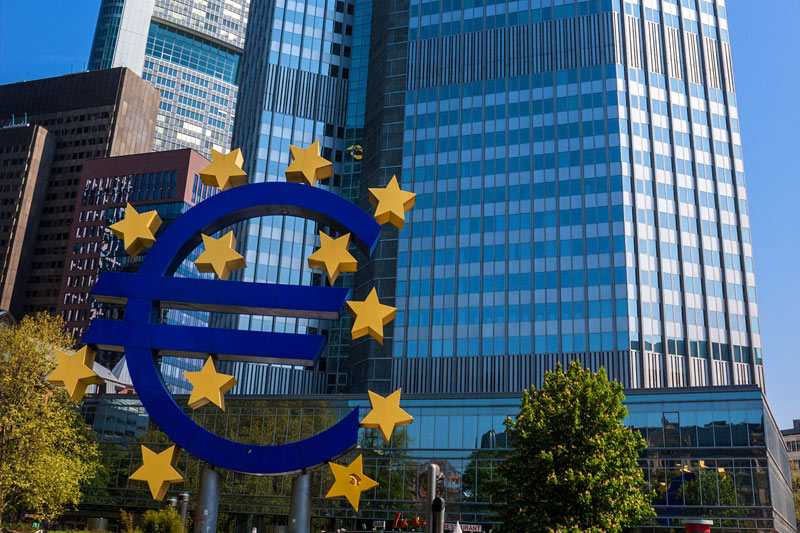ECB Expected to Keep Its Higher Bond-Buying Pace Through Summer By Bloomberg

(Bloomberg) — The European Central Bank is increasingly expected by economists and investors to extend the elevated pace of its emergency bond-buying at its next meeting, despite a likely economic rebound.
HSBC Holdings Plc (LON:HSBA), UBS Group AG (SIX:UBSG) and ABN Amro Bank NV are among those who expect the Governing Council to prolong current stimulus settings on June 10. Economists surveyed before the previous meeting said purchases would probably be scaled back next quarter.
The predictions come after days of top officials pushing back against the idea that they’re ready to slow buying. With more-hawkish colleagues relatively quiet on the matter, the scene is set for yet more ultra-loose policy.
“This tilts the likelihood to a continuation of the ‘significantly’ faster purchase pace into the third quarter, even if the decision may still be close in June and require some element of compromise,” JPMorgan Chase & Co. (NYSE:JPM) economist Greg Fuzesi said in a report.
Investors have picked up on the mood change. German 10-year yields have fallen 10 basis points since climbing to a two-year high last week, suggesting the prospects for a slowdown in the ECB’s program have been pared.
The pandemic purchases were ramped up in March when the U.S. rebound was fueling a global rise in borrowing costs while the euro zone was in a double-dip recession. Buying is now averaging close to 20 billion euros a week compared with 14 billion euros a week at the start of the year.
Sunnier Times
The ECB will unveil new economic projections that should confirm a brighter outlook as vaccinations pick up. Surveys have shown optimism high, with companies raising output and price pressures mounting.
Yet Executive Board member Fabio Panetta said this week he sees no justification for slowing purchases — arguing there’s no evidence inflation pressures will be sustained — and President Christine Lagarde said last week it’s “far too early” to discuss plans for removing stimulus.
French Governor Francois Villeroy de Galhau said the idea of slowing purchases in the third quarter is “purely speculative.” His German counterpart Jens Weidmann, typically one of the more hawkish council members, opted not to discuss current policy in a speech on Thursday. Austria’s Robert Holzmann said buying will be determined by market conditions.
Yields in the euro area have continued to rise from their March levels, and the ECB warned in its latest financial stability review that further upward surprises in U.S. inflation could lead to serious spillover risks.
“It would seem too early to start to reduce the pace of purchases,” HSBC economist Fabio Balboni said in a note to clients, citing “the recovery still in its early phases, inflation below target, and countries having recently increased their fiscal deficit estimates.”
Constructive Ambiguity
One factor policy makers will need to consider is thinner summer liquidity. That may force it to slow buying temporarily — as has happened before with other programs — but it also complicates communication. Some economists reckon the ECB will opt for vaguer language.
Katharina Utermoehl at Allianz (DE:ALVG) SE said a commitment to slow purchases could lead to a situation where an unexpected rise in bond yields would require a rapid policy shift. Instead, “constructive ambiguity” would see the ECB refocus on the pandemic program’s flexibility.
“I don’t think the ECB will make a concrete commitment,” said Birgit Henseler, an economist at DZ Bank AG. “If yields continue to rise, the ECB may buy more. But if the recent consolidation of yields continues, we may only see purchases of 60 to 70 billion euros per month.”
The central bank will “stay on the side of caution and signal ongoing accommodation,” UBS economist Reinhard Cluse said in a report. “Continued purchases at an elevated pace would also support the ECB’s aim to maintain ‘favorable financing conditions’ amid the recent rise in European yields and spreads, and the euro.”
©2021 Bloomberg L.P.

